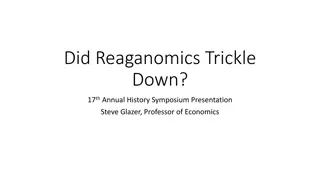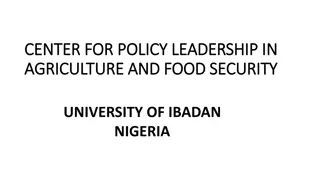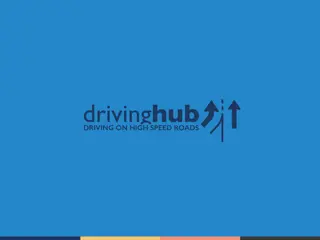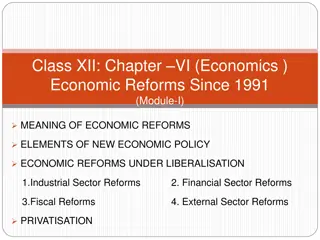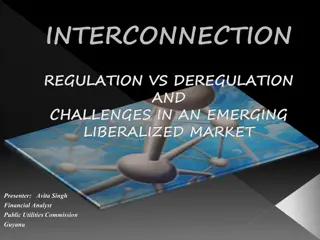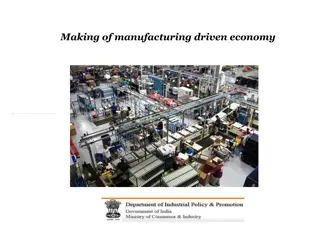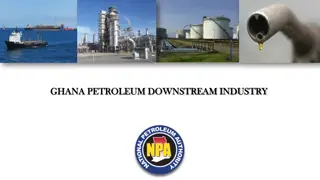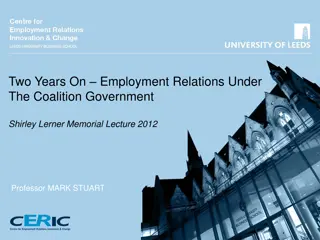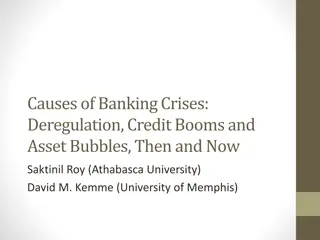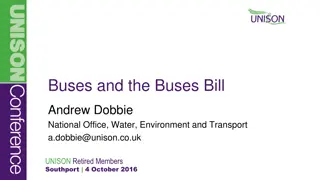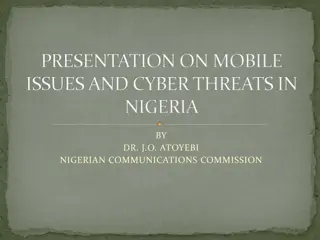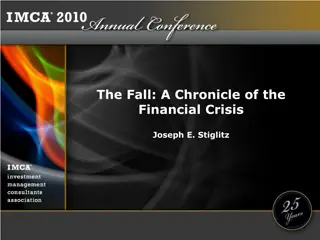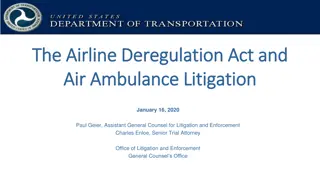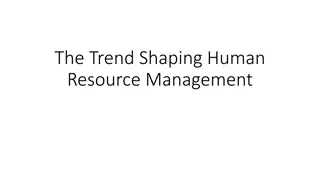Reaganomics Impact on Income Disparities and Economic Policies
Reaganomics, introduced during the 1980s by President Reagan, aimed to address economic challenges through tax cuts, decreased social spending, increased military spending, and deregulation. While the top tax rates were significantly reduced, disparities emerged as lower and middle-income groups fac
1 views • 20 slides
Center for Policy Leadership in Agriculture and Food Security at University of Ibadan, Nigeria
Based at the University of Ibadan, Nigeria, the Center for Policy Leadership in Agriculture and Food Security (CPEEL) focuses on advancing excellence and innovation in energy economics and law. Established in 2011, CPEEL collaborates with various institutions globally and conducts research in energy
0 views • 13 slides
Understanding Training on High-Speed Roads in the UK
This comprehensive program aims to assist driver trainers in helping learners and new drivers develop the necessary skills to navigate high-speed roads in the UK safely. Covering key areas like the high-speed network, risks, deregulation of motorways, essential competencies, and more, it is a valuab
1 views • 49 slides
Economic Reforms Since 1991: Liberalisation and Industrial Sector Reforms
Economic reforms initiated in 1991 under the New Economic Policy focused on liberalisation, privatisation, and globalisation to accelerate economic growth. Liberalisation involved deregulation of the industrial sector, abolishment of industrial licensing, reduction of public sector industries, de-re
0 views • 9 slides
Interconnection Regulation vs. Deregulation Challenges in an Emerging Liberalized Market
Interconnection between telecommunication networks and services plays a vital role in enhancing value for subscribers and facilitating the provision of a wide range of services. Regulation of interconnection is essential to protect competition, achieve social objectives, manage scarce resources, ens
0 views • 22 slides
Regulation vs. Deregulation in Taxicab & FHV Industries in the US
Addressing the International Road Transport Union in 2008, this presentation covers the role of the Taxicab, Limousine & Paratransit Association (TLPA) in representing the for-hire transportation industry in the U.S. It delves into regulatory efforts, industry standards, and the challenges faced by
2 views • 19 slides
Transforming India's Manufacturing Sector: A New Vision
India is focused on becoming a global manufacturing hub by promoting growth, facilitating investment, and enhancing industrial infrastructure. The key pillars for this transformation include improving the business environment, enabling industrial corridors, fostering innovation, and opening up to fo
0 views • 18 slides
Overview of Ghana's Petroleum Downstream Industry
The Ghana Petroleum Downstream Industry plays a vital role in the transportation, processing, distribution, and marketing of refined petroleum products. The industry has seen key policy objectives focusing on deregulation and liberalization to promote competition and efficiency. Historical milestone
3 views • 23 slides
Employment Relations: New Labour vs Coalition Government
Explore the contrasting approaches to employment relations under New Labour and the Coalition Government. New Labour focused on fairness, skills, and partnership, while the Coalition emphasized deficit reduction, austerity, and cuts. The shift towards private sector interests, deregulation, and mark
2 views • 30 slides
Analysis of Banking Crises: Deregulation, Credit Booms, and Global Impacts
This study delves into the causes and patterns of banking crises, focusing on deregulation, credit booms, and asset bubbles. It compares the global financial crisis of 2008-2009 with historical crises worldwide, highlighting common factors leading to such events. The research discusses the role of l
0 views • 23 slides
Structural Transition and International Economic Institutions in Post-Independence India
Post-independence India initially focused on state-directed economic development, leading to a sizable public sector. However, in 1991, the country shifted towards a structural adjustment program, embracing liberal imports, market deregulation, privatization, and financial liberalization. This trans
0 views • 10 slides
Impact of Taxicab Deregulation in Late 70s and Early 80s
Deregulation of taxicab industries in cities like Indianapolis, Seattle, and San Diego in the late 1970s and early 1980s led to mixed outcomes. The reports from the U.S. Department of Transportation highlighted various issues post-deregulation, including increased fares, service complaints, rise in
0 views • 6 slides
Challenges Faced by the Bus Industry Since Deregulation
The bus industry has faced challenges since deregulation in 1986, leading to significant impacts on bus services across regions. The nightmare of deregulation allowed any operator to run routes without consideration for unprofitable services, particularly affecting municipal companies. Subsequent au
0 views • 15 slides
Mobile Issues and Cyber Threats in Nigeria - Presentation by Dr. J.O. Atoyebi, NCC
Evolution of GSM in Nigeria, the impact of mobile phone deregulation, and the rise of cyber threats highlighted in a presentation by Dr. J.O. Atoyebi of the Nigerian Communications Commission. The report reveals Nigeria's position in global internet security threats and the challenges faced by the c
0 views • 7 slides
The Rail Renaissance & Brave New World in the 21st Century
Diving into the rail industry's evolution through deregulation and vertical integration, the document explores the performance of U.S. freight railroads post-Staggers Act, challenges faced, and potential promises under the new administration. It shines a light on the changing landscape of the railro
0 views • 30 slides
The Fall: A Chronicle of the Financial Crisis by Joseph E. Stiglitz
Excess credit fueled a housing bubble, worsened by poorly designed mortgages. Securitization shifted costs of flawed mortgage products. The crisis was predictable, with unsustainable trends in savings, house prices, and incomes. The aftermath included long-term consequences, deleveraging, and organi
0 views • 36 slides
Key Legal Aspects of Airline Deregulation and Supreme Court Decisions
This content discusses key aspects of the Airline Deregulation Act, the Supremacy Clause, and important Supreme Court decisions like Morales v. Trans World Airlines and American Airlines v. Wolens. It highlights how federal laws preempt state regulations concerning airline pricing, routes, and servi
0 views • 13 slides
The Changing Landscape of Human Resource Management in a Globalized World
Human resource management is evolving due to trends such as globalization, technology, deregulation, and economic challenges. Companies are expanding abroad to tap into new markets and partnerships, leading to increased competition and the need for world-class operations to lower costs. Globalizatio
0 views • 14 slides
